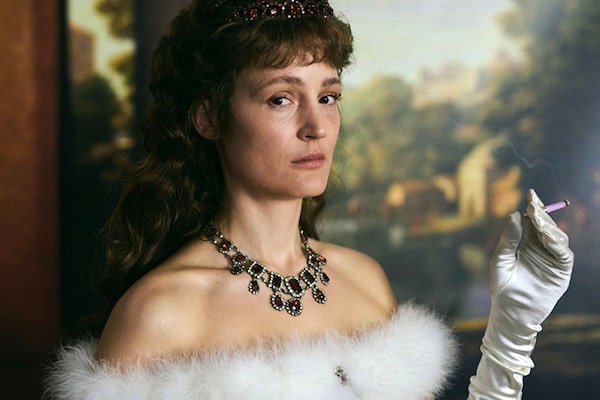
Vicky Krieps as Empress Elisabeth of Austria in Corsage.Courtesy of TIFF
- Corsage
- Written and directed by Marie Kreutzer
- Starring Vicky Krieps and Florian Teichtmeister
- Classification: N/A; 113 minutes
- Opens in select theatres Jan. 6
Critic’s Pick
The poster advertising Corsage depicts Vicky Krieps, as Empress Elisabeth of Austria, wearing a fur-trimmed décolleté ball gown – and raising a white-gloved middle finger at the viewer. The gesture is an exaggeration of a fleeting moment in the film, but it does summarize Corsage’s refreshing attitude toward the conventions of the biopic. In a fictionalized account of Empress Elisabeth’s 41st year, writer and director Marie Kreutzer offers unrepentant anachronism and shifting perspectives on a character as unsettling as she is fascinating.
Celebrated for her long hair and tiny waist, achieved through rigorous corseting, Sissi, as she was called, is a subject of continuing interest in Europe – two miniseries in the past two years and multiple movies before that. She is remembered chiefly for her beauty, captured by Franz Winterhalter’s romantic portraits, but she was not without political significance. A popular figure, she embraced Hungary to aid her husband, Emperor Franz Joseph, in establishing the Austro-Hungarian empire’s dual monarchy in 1867 and stabilizing his realm. Her assassination by an anarchist in 1898 was one in a chain of violent deaths that eventually undid the Hapsburg monarchy.

Krieps won a best actress award at the Cannes Film Festival last spring for Corsage.Courtesy of TIFF
In this film, Franz Joseph (Florian Teichtmeister) quietly reminds her that he controls the state, she merely represents it. She is an adornment – a corsage is both the bodice of a woman’s dress and the bouquet that is pinned to it – and, at 40, she is terrified that her flower will fade. So Sissi is clearly ready for her feminist revival, yet as Kreutzer and Krieps enter this crowded field, they are uninterested in fashioning an obvious heroine for contemporary tastes. Instead, they create a mutable personality characterized by such range and instability that one follower compares her to a chaotic museum.
She has political instincts, but her husband squelches them; she has maternal love, but her children distrust her; she has a ferocious need to be seen but craves a private life. She is both decorous and wild, intelligent and impetuous, thoughtful yet obsessed with appearances. She is often melancholic, and today we might diagnose bipolar disorder. That Krieps can summarize all this in one performance gives you an idea of why Corsage won her a best actress award at the Cannes Film Festival last spring.
Aside from this unpredictable character, Kreutzer’s clearest breaks with convention are the film’s expanding anachronisms. For the eagle-eyed, there are initial hints: a telephone hanging on a palace wall, modern glass doors in a marble entrance. For the persnickety, there are impossibilities: the empress smoking in front of her subjects or being filmed, a good decade before moving pictures existed. Eventually, there are unmistakable grand gestures as the characters dance to the Rolling Stones and the film foreshadows the locale of her assassination on a gleaming modern yacht.
The director is unequivocal: We can only see Sissi through a 21st-century lens. Beyond that, the anachronisms play neatly to Kreutzer’s desire – and Sissi’s – to rip the veil off royal appearances. Court life is but a show in which Franz Joseph sports false whiskers while Sissi stages her fainting fits.
What to watch in 2023: Our favourite new movies
Of course, the contemporary audience will sympathize with a woman trapped by patriarchal conventions, and Krieps makes Sissi’s more mischievous rebellions winsome. Meanwhile, her many attempts to escape – submerging herself in baths or pools, galloping on horseback, pursuing ill-advised romances – are comprehensible if alarming.
Teichtmeister’s Franz Joseph is an equally complex foil, adoring but frustrated and potentially cruel, certain of his prerogative and visibly destabilized by a woman who won’t play along.
In the supporting cast, there is quiet heartbreak from Katharina Lorenz and Jeanne Werner as the ladies-in-waiting suffering under Sissi’s tyrannical yoke. Because Kreutzer and Krieps dare to make Sissi nasty, particularly thoughtless in her relations with her ladies, her young daughter and the various men she insists must fall in love with her.
It is tempting to compare her to Princess Diana, a narcissistic media manipulator on the one hand and a sensitive woman deeper than the icon she has created on the other. But Corsage is a work of fiction, and its main character is, thankfully, far more complicated and interesting than the real thing.